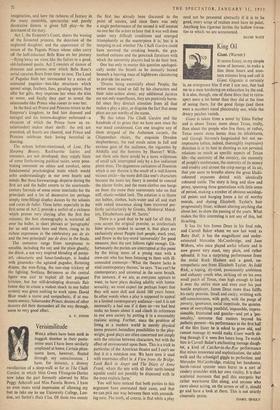King Oil
Giant. (Warner.)
IT seems funny, to my simple sense of humour, to make a
film three hours and nine- me in a state bordering on exhaustion by the end.
It is also, though, one of those films that in retro- spect seem a lot better than they did at the time of seeing them, for the good things (and there were a number) stand pleasurably out, while the dreary patches vanish.
Giant is taken from a novel by Edna Ferber and is about Texas; more about Texas, really, than about the people who live there, or rather, Texas seems more heroic than its inhabitants, and George Stevens's longwinded but not un- impressive (often, indeed, thoroughly impressive) direction is at its best in showing us not personal relations so much as specific aspects of Texan life—the enormity of the country, the enormity of people's exuberance, the enormity of its money and crudity and almost the crisp energy of its air, that you seem to breathe above the great khaki- coloured expanses dotted with identically coloured cattle. The story is long and slow and prosy, spanning three generations with little sense of period, making a number of obvious sociologi- cal points and banging home a lot of worthy morals, and dyeing Elizabeth Taylor's hair progressively bluer, without altering anything else about her, to show the passing of the years. What makes the film interesting is not any of this, but its acting.
It has the late James Dean in his final role, and Carroll Baker whom we saw last week as Baby Doll; it has the magnificent and under- estimated Mercedes McCambridge, and Jane Withers, who once played awful infants and is now grown very stout, very plain, and rather splendid. It has a surprising performance from the stolid Rock Hudson and a good, un- sympathetic one from Elizabeth Taylor. As Jedd Rick, a loping, sly-eyed, passionately ambitious and unhappy youth who, striking oil on his own small patch of Texas, rises high enough to lord it over the entire state and even over his past hostile employer, James Dean more than fulfils his early promise. Small and cocky, writhing with self-consciousness, with guile, with the pangs of poverty, ignorance, social ineptitude, the quintes- sence of everything youthful, impossible, impres- sionable, frustrated and gauche—and yet a `per- sonality,' someone that matters beyond his pathetic present—his performance in the first half of the film (later he is asked to grow old, and cannot manage it) would make Giant worth sit- ting through if it were five hours long. To match him is Carroll Baker's enchanting teenage daugh- ter, a kind of Catcher-in-the-Rye performance that mixes innocence and sophistication, the adult walk and the schoolgirl giggle to perfection; and Mercedes McCambridge, making her handsome, harsh-voiced spinster seem burnt to a sort of cindery smoulder with her own vitality. It is their scattered moments that pull this energetic but rather wearisome film along, and anyone who cares about acting, on the screen or off it, should go and have a look at them. This is not strictly cinematic praise.
ISABEL QUIGLY


































 Previous page
Previous page